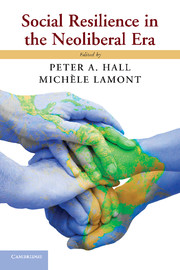Book contents
- Frontmatter
- Contents
- Contributors
- Foreword
- Prologue
- Acknowledgments
- Introduction
- Part I Neoliberalism
- Part II The Social Sources of Individual Resilience
- Part III Social Resilience on a Macro Scale
- PART IV Communities and Organizations as Sites for Social Resilience
- 9 Neoliberalism in Québec
- 10 Can Communities Succeed When States Fail Them?
- 11 Cultural Sources of Institutional Resilience
- 12 The Origins and Dynamics of Organizational Resilience
- Index
- References
11 - Cultural Sources of Institutional Resilience
Lessons from Chieftaincy in Rural Malawi
Published online by Cambridge University Press: 05 May 2013
- Frontmatter
- Contents
- Contributors
- Foreword
- Prologue
- Acknowledgments
- Introduction
- Part I Neoliberalism
- Part II The Social Sources of Individual Resilience
- Part III Social Resilience on a Macro Scale
- PART IV Communities and Organizations as Sites for Social Resilience
- 9 Neoliberalism in Québec
- 10 Can Communities Succeed When States Fail Them?
- 11 Cultural Sources of Institutional Resilience
- 12 The Origins and Dynamics of Organizational Resilience
- Index
- References
Summary
One of the great challenges of the neoliberal era is that of institutional capacity: the capacity of collectivities – from communities, to states, to transnational bodies – to create or sustain resilient social forms that embody collective purposes, enforce rights and obligations, and have the capacity to organize collective action. Neoliberalism, both as ideology and as policy, has a love–hate relationship with institutions. On the one hand, as Evans and Sewell (see Chapter 1) make clear, neoliberal ideology has been defined by an attack on government – both public provision of welfare services and government regulation of the economy. Globally, one of the signature policies of the neoliberal era was structural adjustment, which forced government retrenchment and drastic cutbacks in government services throughout the Global South (Stiglitz 2002). At the same time, however, the collapse of the Soviet Union and attempts to establish functioning market economies in many formerly socialist states have highlighted the need for effective institutions, both legal institutions to make markets work (Fligstein 2001) and government institutions capable of restraining ethnic antagonisms and providing social stability.
Even as neoliberal theorists have decried excessive government, the neoliberal era has produced a welter of new or newly empowered institutions through which the world's business is supposed to get done. Indeed, the neoliberal era has fostered wide-ranging institutional innovation (Fukuyama 2004; Slaughter 2004). Alongside the frayed authority of nation states and high-modernist Weberian bureaucracies have emerged more heterogeneous institutional forms: the profusion of nongovernmental organizations (NGOs), and transnational social movements that address human rights or the AIDS epidemic (Keck and Sikkink 1998; Callaghy, Kassimir, and Latham 2001; Calhoun 2008; Hammack and Heydemann 2009; Watkins, Swidler, and Hannan 2012); initiatives for decentralization and participatory governance (Baiocchi, Heller, and Silva 2008); and new or enhanced international organizations that regulate global trade, provide peacekeeping, or attempt to establish and enforce human rights (de Waal 2009; Sikkink 2009).
- Type
- Chapter
- Information
- Social Resilience in the Neoliberal Era , pp. 319 - 345Publisher: Cambridge University PressPrint publication year: 2013
References
- 18
- Cited by



